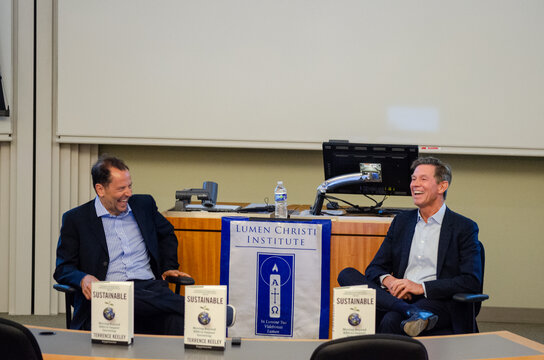Forming the Leaders of Tomorrow at Booth School of Business


To confront these questions, the Lumen Christi Institute brought top thought leaders from around the country to the Booth School of Business at the heart of the University of Chicago’s campus. Business ethics has become a major focus in recent years, in large part due to growing concern over unethical practices and contemporary critiques of global capitalism. This past spring, in partnership with Catholics at Booth, a student organization, LCI provided a robust program of scholarship to equip the business leaders of tomorrow with the formative thought of the Catholic tradition. Supplied with the wisdom of Catholic Social Teaching, speakers such as Dr. Mary Hirschfeld, Dr. Amir Sufi, Dr. Luigi Zingales, Terrence Keeley (former executive at BlackRock), and Sally Blount (CEO of Catholic Charities of Chicago) addressed students on creative approaches to the business problems of today.
Discussion with Professor Mary Hirschfeld and Professor Amir Sufi, March 30
On March 30, Professor Mary Hirschfeld (University of Notre Dame) spent the day at the Booth School of Business, beginning with a lunch conversation with business students and culminating in a public lecture titled "Rethinking Economic Inequality: a Theological Perspective."
With a PhD in Economics from Harvard and a PhD in Theology from the University of Notre Dame, Hirschfeld, both economist and theologian, contributed a rare combination of expertise to the discussion. Inequality is a popular topic of focus in higher education, but Hirschfeld challenged listeners to take a still more radical view around today’s wealth inequality: apply Aquinas. Using a Thomistic framework, Hirschfeld taught students ways through which society could move "Toward a Humane Economy," locating the source of economic life in the search for human happiness first. Money was made to serve human beings, not the other way around.
Later that evening, Hirschfeld gave a public lecture at the Booth School of Business. She further highlighted the limits of secular discourse around the problem of economic inequality, and the important role theology has in this sphere. Hirschfeld further foregrounded genuine human flourishing in Thomistic thought and discussed ethical responses today to the problem of economic inequality. Amir Sufi, Bruce Lindsay Professor of Economics and Public Policy at the University of Chicago Booth School of Business, gave a response to Hirschfeld’s argument. Identifying himself as a longtime fan of Hirschfeld’s work, Sufi added an interfaith and interdisciplinary view, drawing from his own research in corporate finance and macroeconomics, as well as from Islamic perspectives on the danger of pursuing wealth for its own sake.
Professor Luigi Zingales Interviews Terrence Keeley, April 13
Can financial managers fulfill their fiduciary obligations while pursuing the common good? Is it even possible to do well by doing good, and why might ESG (environment, social, governance) investing be a false solution to this problem? To address these questions, the Lumen Christi Institute and Catholics at Booth brought an interview to Booth’s campus featuring Luigi Zingales, Robert C. McCormack Distinguished Service Professor of Entrepreneurship and Finance at Booth School of Business, and Terrence Keeley, former Managing Director of BlackRock, Inc., Chairman and CIO of 1PointSix LLC, and recent appointee by Pope Francis to oversee the Vatican Bank. The two had a spirited conversation on Keeley’s new book, Sustainable: Moving Beyond ESG to Impact Investing.
Terrence Keeley had lunch with Booth students to discuss his alternative to ESG investing: impact investing. The huge growth in ESG investments shows that there is a market. However, the numbers don’t look good from a data, definitions, or process perspective. But we can do well and do good, Keeley insists. By definition, there is a market in serving the underserved: to uplift minority-owned businesses or to convert factories to green energy. Directly investing in these efforts can give a return to the savvy investor as well as improve the lives of our brothers and sisters and the health of our planet.
“Solving large social and environmental problems requires thoughtful, dedicated capital. Solving our problems can also be quite lucrative when it’s done in the right way: Doing well by doing good is the 'big idea' behind ESG – and in my opinion the best way to achieve this is by mindfully investing more capital to serve the underserved."
Lecture and Discussion with Sally Blount, May 11
Over the last 10 years, “corporate purpose” has been cast in the spotlight, with companies writing ever more expansive purpose statements about how their firms make the world a better place and create meaningful communities. As people of faith, our hope must be in something bigger and more profound. What might Catholic Social Teaching suggest around these questions?
On May 11, Lumen Christi and Catholics at Booth partnered to bring Sally Blount, President and CEO of Catholic Charities of Chicago and former dean at the Kellogg School of Management at Northwestern University, back to Booth’s campus to engage these challenges with the future business leaders of tomorrow. (Years ago, Blount served as Booth faculty, before moving to Stern School of Business at New York University where she taught and eventually became vice dean.)
Blount shared her wisdom with students, including her lessons from her work with Catholic Charities, where she is leading the organization through a three-year capabilities-building and strategic planning process that will reimagine charities’ governance and deepen its impact — as they prepare to serve those in need in an increasingly polarized and economically unequal, post-pandemic world.
The momentum each of these conversations with these scholars and experts will carry beyond the lecture hall at Booth’s campus, to the dinner table, and beyond for students who are preparing to take the lead as the businessmen and businesswomen of tomorrow. LCI is excited to be a part of shaping that future.